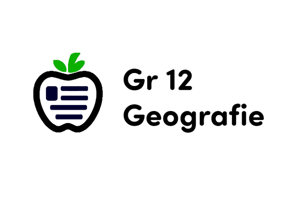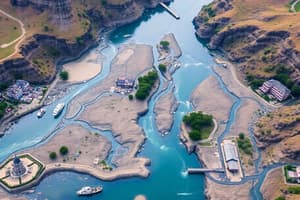Podcast
Questions and Answers
What is the primary purpose of building dams and reservoirs in river water management?
What is the primary purpose of building dams and reservoirs in river water management?
- To prevent flooding
- To generate hydroelectric power
- To store water during periods of abundance for use during periods of scarcity (correct)
- To promote aquatic life
What is a major challenge in water management due to climate change?
What is a major challenge in water management due to climate change?
- Increased water scarcity
- Decreased water quality
- Increased water pollution
- Changes in precipitation patterns and water availability (correct)
What is the primary goal of water allocation in river water management?
What is the primary goal of water allocation in river water management?
- To allocate water resources among different users, such as agriculture, industry, and municipalities (correct)
- To reduce water waste
- To distribute water equally among all users
- To prioritize water use for human consumption
What is a key aspect of transboundary water management?
What is a key aspect of transboundary water management?
What is a major consequence of poor water management in rivers?
What is a major consequence of poor water management in rivers?
What is the primary goal of water conservation in river water management?
What is the primary goal of water conservation in river water management?
What is a key challenge in water management?
What is a key challenge in water management?
What is the primary purpose of international agreements in water management?
What is the primary purpose of international agreements in water management?
Flashcards are hidden until you start studying
Study Notes
Water Management in Rivers
Importance of Water Management
- Rivers are a vital source of water for human consumption, agriculture, and industry
- Effective water management is crucial to ensure sustainable use of river water resources
- Poor water management can lead to water scarcity, pollution, and degradation of ecosystems
Water Management Strategies
- Water Storage: Building dams and reservoirs to store water during periods of abundance for use during periods of scarcity
- Water Allocation: Allocating water resources among different users, such as agriculture, industry, and municipalities
- Water Conservation: Implementing measures to reduce water waste and increase efficiency in water use
- Flood Control: Implementing measures to prevent or mitigate the effects of flooding, such as levees and floodwalls
Water Management Challenges
- Balancing Human Needs with Environmental Needs: Managing water resources to meet human needs while also maintaining healthy ecosystems
- Climate Change: Adapting to changes in precipitation patterns and water availability due to climate change
- Water Pollution: Managing water quality to prevent pollution from agricultural runoff, industrial waste, and other sources
- Conflict Resolution: Resolving conflicts between different stakeholders with competing interests in water resources
International Cooperation
- Transboundary Water Management: Managing water resources that cross national borders, requiring cooperation between countries
- International Agreements: Establishing agreements and treaties to govern the use of shared water resources
- Water Diplomacy: Fostering cooperation and dialogue among countries to prevent water-related conflicts
Water Management in Rivers
Importance of Water Management
- Rivers are a vital source of water for human consumption, agriculture, and industry, supporting 2/3 of the world's population
- Effective water management is crucial to ensure sustainable use of river water resources, preventing water scarcity, pollution, and ecosystem degradation
Water Management Strategies
Water Storage
- Building dams and reservoirs to store water during periods of abundance for use during periods of scarcity
- Allows for controlled release of water to prevent flooding and ensure consistent water supply
Water Allocation
- Allocating water resources among different users, such as agriculture, industry, and municipalities
- Ensures fair distribution of water among competing demands
Water Conservation
- Implementing measures to reduce water waste and increase efficiency in water use
- Examples include efficient irrigation systems, water-saving appliances, and reducing leaks
Flood Control
- Implementing measures to prevent or mitigate the effects of flooding, such as levees and floodwalls
- Protects human settlements, infrastructure, and ecosystems from flood damage
Water Management Challenges
Balancing Human Needs with Environmental Needs
- Managing water resources to meet human needs while maintaining healthy ecosystems
- Ensures sustainable use of water resources and preserves ecosystem services
Climate Change
- Adapting to changes in precipitation patterns and water availability due to climate change
- Requires flexible water management strategies to address uncertain water supplies
Water Pollution
- Managing water quality to prevent pollution from agricultural runoff, industrial waste, and other sources
- Protects human health and ecosystem integrity
Conflict Resolution
- Resolving conflicts between different stakeholders with competing interests in water resources
- Ensures fair and equitable access to water resources
International Cooperation
Transboundary Water Management
- Managing water resources that cross national borders, requiring cooperation between countries
- Ensures sustainable use of shared water resources and prevents conflicts
International Agreements
- Establishing agreements and treaties to govern the use of shared water resources
- Examples include the 1997 UN Convention on the Law of the Non-Navigational Uses of International Watercourses
Water Diplomacy
- Fostering cooperation and dialogue among countries to prevent water-related conflicts
- Encourages mutual understanding and cooperation among countries sharing water resources
Studying That Suits You
Use AI to generate personalized quizzes and flashcards to suit your learning preferences.




